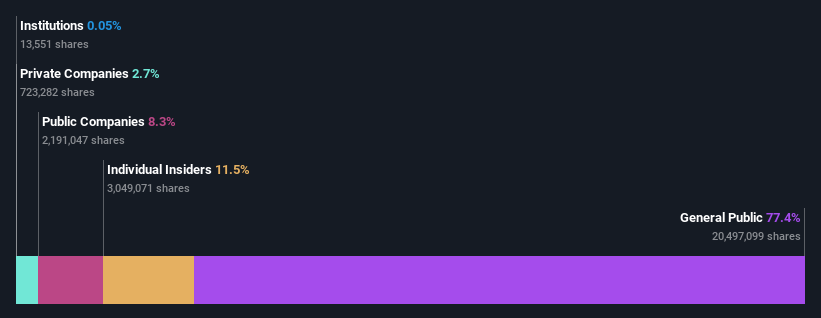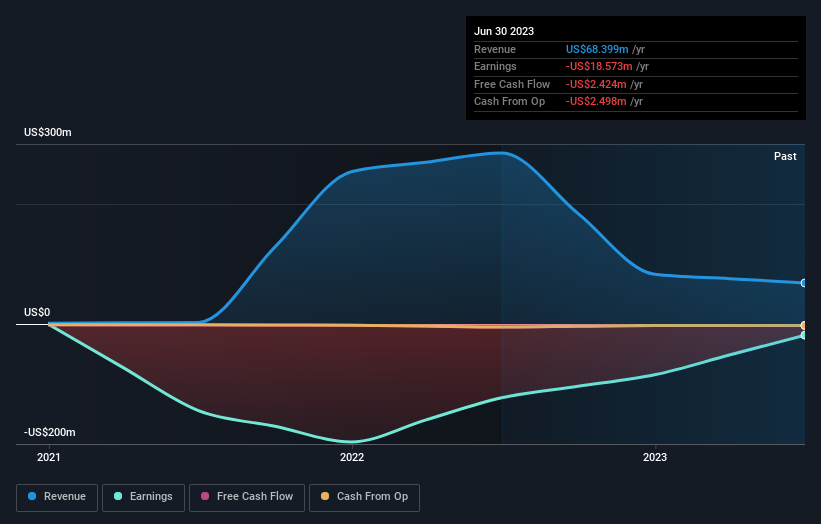While insiders are yet to place a huge wager on Kaixin Auto Holdings (NASDAQ:KXIN), retail investors saw 11% gain on holdings value last week
Key Insights
Significant control over Kaixin Auto Holdings by retail investors implies that the general public has more power to influence management and governance-related decisions
A total of 14 investors have a majority stake in the company with 23% ownership
Using data from company's past performance alongside ownership research, one can better assess the future performance of a company
If you want to know who really controls Kaixin Auto Holdings (NASDAQ:KXIN), then you'll have to look at the makeup of its share registry. The group holding the most number of shares in the company, around 55% to be precise, is retail investors. In other words, the group stands to gain the most (or lose the most) from their investment into the company.
Kaixin Auto Holdings is yet to capture a wider attention from insiders judging from their holdings size. Meanwhile, Retail investors have benefitted after market cap hit US$130m last week. Generally speaking, we tend to see lower insider ownership in companies that were previously publicly owned.
Let's delve deeper into each type of owner of Kaixin Auto Holdings, beginning with the chart below.
See our latest analysis for Kaixin Auto Holdings
What Does The Lack Of Institutional Ownership Tell Us About Kaixin Auto Holdings?
Institutional investors often avoid companies that are too small, too illiquid or too risky for their tastes. But it's unusual to see larger companies without any institutional investors.
There could be various reasons why no institutions own shares in a company. Typically, small, newly listed companies don't attract much attention from fund managers, because it would not be possible for large fund managers to build a meaningful position in the company. It is also possible that fund managers don't own the stock because they aren't convinced it will perform well. Institutional investors may not find the historic growth of the business impressive, or there might be other factors at play. You can see the past revenue performance of Kaixin Auto Holdings, for yourself, below.
We note that hedge funds don't have a meaningful investment in Kaixin Auto Holdings. Our data shows that Moatable, Inc. is the largest shareholder with 8.3% of shares outstanding. Ping Wang is the second largest shareholder owning 5.5% of common stock, and Lin Lu holds about 3.4% of the company stock. Additionally, the company's CEO Mingjun Lin directly holds 0.8% of the total shares outstanding.
A deeper look at our ownership data shows that the top 14 shareholders collectively hold less than half of the register, suggesting a large group of small holders where no single shareholder has a majority.
While it makes sense to study institutional ownership data for a company, it also makes sense to study analyst sentiments to know which way the wind is blowing. We're not picking up on any analyst coverage of the stock at the moment, so the company is unlikely to be widely held.
Insider Ownership Of Kaixin Auto Holdings
The definition of an insider can differ slightly between different countries, but members of the board of directors always count. The company management answer to the board and the latter should represent the interests of shareholders. Notably, sometimes top-level managers are on the board themselves.
Insider ownership is positive when it signals leadership are thinking like the true owners of the company. However, high insider ownership can also give immense power to a small group within the company. This can be negative in some circumstances.
Shareholders would probably be interested to learn that insiders own shares in Kaixin Auto Holdings. It has a market capitalization of just US$130m, and insiders have US$11m worth of shares, in their own names. It is good to see some investment by insiders, but we usually like to see higher insider holdings. It might be worth checking if those insiders have been buying.
General Public Ownership
The general public, mostly comprising of individual investors, collectively holds 55% of Kaixin Auto Holdings shares. With this amount of ownership, retail investors can collectively play a role in decisions that affect shareholder returns, such as dividend policies and the appointment of directors. They can also exercise the power to vote on acquisitions or mergers that may not improve profitability.
Public Company Ownership
We can see that public companies hold 5.9% of the Kaixin Auto Holdings shares on issue. This may be a strategic interest and the two companies may have related business interests. It could be that they have de-merged. This holding is probably worth investigating further.
Next Steps:
It's always worth thinking about the different groups who own shares in a company. But to understand Kaixin Auto Holdings better, we need to consider many other factors. Be aware that Kaixin Auto Holdings is showing 4 warning signs in our investment analysis , you should know about...
If you would prefer check out another company -- one with potentially superior financials -- then do not miss this free list of interesting companies, backed by strong financial data.
NB: Figures in this article are calculated using data from the last twelve months, which refer to the 12-month period ending on the last date of the month the financial statement is dated. This may not be consistent with full year annual report figures.
Have feedback on this article? Concerned about the content? Get in touch with us directly. Alternatively, email editorial-team (at) simplywallst.com.
This article by Simply Wall St is general in nature. We provide commentary based on historical data and analyst forecasts only using an unbiased methodology and our articles are not intended to be financial advice. It does not constitute a recommendation to buy or sell any stock, and does not take account of your objectives, or your financial situation. We aim to bring you long-term focused analysis driven by fundamental data. Note that our analysis may not factor in the latest price-sensitive company announcements or qualitative material. Simply Wall St has no position in any stocks mentioned.


